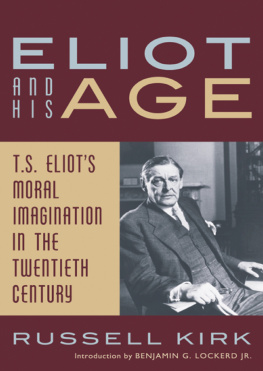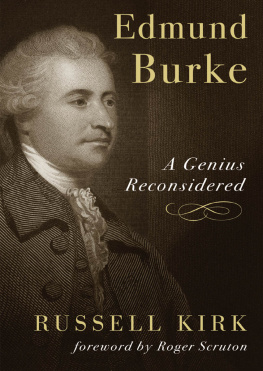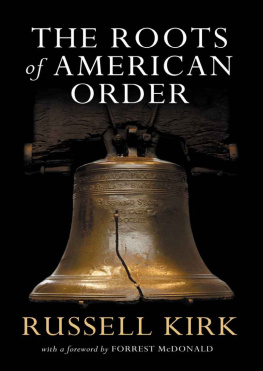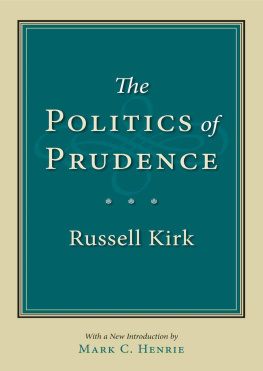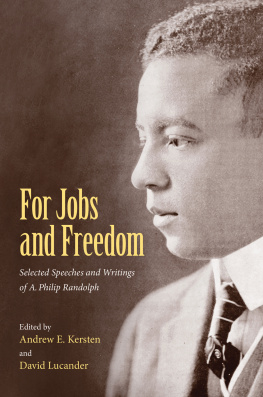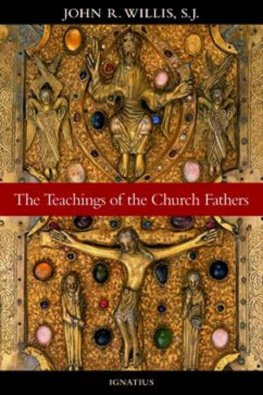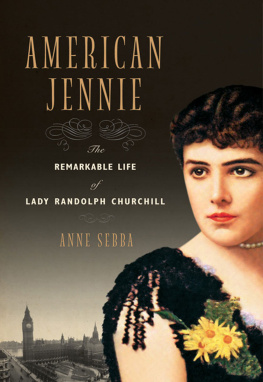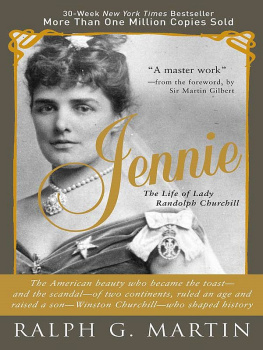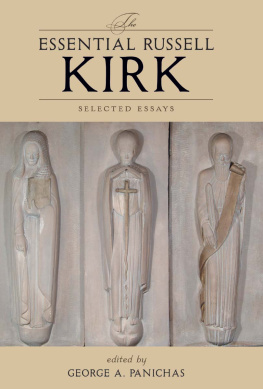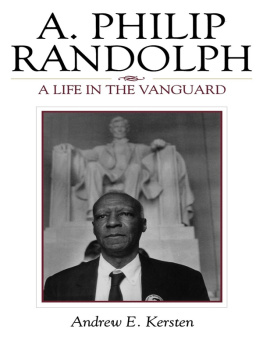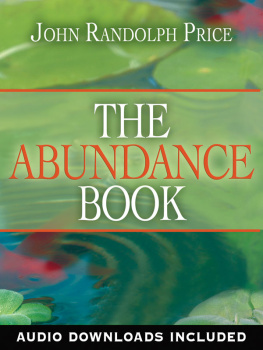Barakaldo Books 2020, all rights reserved. No part of this publication may be reproduced, stored in a retrieval system or transmitted by any means, electrical, mechanical or otherwise without the written permission of the copyright holder.
Publishers Note
Although in most cases we have retained the Authors original spelling and grammar to authentically reproduce the work of the Author and the original intent of such material, some additional notes and clarifications have been added for the modern readers benefit.
We have also made every effort to include all maps and illustrations of the original edition the limitations of formatting do not allow of including larger maps, we will upload as many of these maps as possible.
RANDOLPH OF ROANOKE
A STUDY IN CONSERVATIVE THOUGHT
BY
RUSSELL KIRK
I would not live under King Numbers. I would not be his steward, nor make him my task-master. I would obey the principle of self-preservation, a principle we find even in the brute creation, in flying from this mischief.
JOHN RANDOLPH OF ROANOKE at the Virginia Convention, 1829
CHAPTER ONERandolph and This Age
THIS little book is an account of the mind of a radical man who became the most eloquent of American conservative thinkers. John Randolph, the enemy of Jefferson, has been the subject of several biographies, one of themWilliam Cabell Brucesthorough and good. I do not propose to describe Randolphs life, therefore, but rather to outline his ideas and suggest their influence.
Randolphs career and character are familiar enough to those who read American history. His bitter hates and passionate loves, his fits of madness, his bewildering extemporaneous eloquence, his duels, his beautiful letters, his sardonic wit, his outbursts of prophecy and his visions of devils, his brandy and his opium, his lonely plantation life, his quixotic opposition to the great economic and political powers of his dayeveryone knows something of these. He was out of the pages of Byron and Disraeli. But he was also a man of genius, a genius literary and political. Few of us remember that he was a master of English style and a major influence in conservative social thought. A recent history of American literature, got up on a grand scale, has kind words for some obscure literary hacks but does not mention Randolph even in the Index; and he has not fared much better in histories of American political ideas. I think it is a pious act, pious in the old Roman sense, to call John Randolph up from among the shades.
America, which presently finds herself the chief protector of the traditions of Western society and therefore a conservative nation, has suffered from a paucity of men of conservative intellect. She needs to re-examine her first principles, if she is to withstand the social atomization which most of the world is experiencing. In consequence of this need, Calhouns thought already is receiving the attention it has long deserved. Randolph was the preceptor of Calhoun, a champion of the old ways when Calhoun himself was an innovator. But Randolph merits study for his own sake. This volume is an analysis of his principles, dealt with topically, not chronologically. Our age could profit immensely from a stricter study of Burke, and, in a smaller way, we can benefit similarly from a reinvestigation of the freedom-loving, innovation-hating Randolph.
John Randolph of Roanoke was born three years before the adoption of the Declaration of Independence, and he died during the great nullification controversy. No mans life displays more clearly the chain of events which linked the proclamations of 1776 and of 1832. Jefferson, whose pupil, in a sense, Randolph was, belonged to the earlier generation of natural-rights thinkers; Calhoun, who, in a sense, was the disciple of Randolph, belonged to the later generation which put its faith in legal logic. Randolph sneered at both; he fought the administration of John Adams, and slashed the administration of Jefferson, and harried every other President of his time. In a study of Randolphs ideas we can see the progress of the forces which made inevitable the events of 1832 and 1861.
Yet Randolphs was not a philosophy of flux. Although formed in an age of change, it was internally consistent. It was an appeal to tradition, against the god Whirl, and it has its disciples yet. John Randolph battled the world of his day, and three decades after his death his beloved country of Virginia rendered to Randolphs principles the last full measure of devotion. His historical significance, both as influence and as index, is great Although Randolph and the other Old RepublicansNathaniel Macon, Spencer Roane, John Taylor of Caroline, Richard Stanford, and the restfailed in their day to halt the political and economic march they dreaded, and at no time could command a majority in the nation or in the South, they were to triumph in the thirty years which preceded the Civil War. Randolph was to live to see the beginning of that victory, that fleeting triumph. No one would maintain that Randolphs impatient tongue alone caused this alteration in southern thought, but nevertheless Randolph exerted over the minds of the generation which followed his a force accorded to few parliamentary leaders. It was Randolph that Hayne quoted against Webster; it was Randolph to whom Calhoun listened, pondering, from his presiding chair in the Senate; it was Randolph of whom Beverley Tucker wrote to Hammond and his colleagues. The remnant of the Old Republican faction split during Jacksons administration: some, like Benjamin Watkins Leigh, became Whigs; some found their places among Calhouns Democrats; some went over to the Jacksonians; some fought all parties. And yet a measure of the state-rights, aristocratic, libertarian, agrarian philosophy of John Randolph was retained by all of them, and those southern factions were to find themselves united in the year of Armageddon.
Concerning Old Republican political thought, little has been written. In recent years something has been made, with justice, of John Taylor of Caroline, an ally of Randolphs faction. Taylors equalitarian principles, however, were by no means identical with those of Randolph. Randolphs speeches, which so astounded his contemporaries by virtue of their bitter wit, unpremeditated eloquence, and flashes of genius, never have been collected; nor have his numerous letters. We can read Taylors and Thomas Coopers and Calhouns books today, but Randolph wrote nothing for publication except a few revisions of his longer speeches and a few letters to the newspapers. The man of Roanoke despised hard-and-fast expositions of political ideas and perhaps would not have written Construction Construed or A Disquisition on Government even had time and health permitted; in this, at least, he was like Jefferson.


